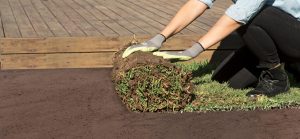Our Step-By-Step Guide to Laying a New Lawn
You have prepared your area and you’re now waiting of your turf delivery. But you are left wondering how you’re going to install your lawn to ensure it will have the best possible growing environment.

Below you will find all the best tips and tricks on installing your new turf.
- Preparation
- Laying
- Cutting / Shaping Your Lawn
- Watering
- Mowing
- Establishment
- Fertilising
STEP 1: PREPARATION
- Once you have a minimum of 100-150mm of 80% washed-river sand, 20% organic material (soil) turf underlay levelled (100-200mm of 100% washed-sand for Sir Grange), apply a Starter Fertiliser (Lawn Solutions Lawn Launcher Starter Fertiliser). This will encourage deeper root growth and support your lawn during the establishment phase.
- Note: If you chose TifTuf, Lawn Launcher isn’t necessary due to its fast root system.
- We strongly encourage installing an automatic irrigation system during the preparation process for a new lawn. This is a great way to regularly water the turf consistently, which will reduce your hand maintenance and maximise watering efficiency.
For further information on how to prepare your area, read our Area Preparation Guide.
STEP 2: LAYING
- We harvest turf the day prior to the delivery day. It’s crucial to lay your turf the same day as delivery.
- Start laying your turf from the furthest point of entry and work your way back, being careful not to walk over freshly laid turf.
- Always butt the ends of your rolls tightly together, do not leave a gap in between.
- Use full rolls around hard surfaces like paths and fences as these dry out the fastest.
- Install turf in a brick-work pattern so that the joints of the rolls are staggered. This ensures turf establishes more evenly and prevents erosion.
- Install rolls across slopes.
- If installing a large area on a day where temperatures are higher than 25 degrees, irrigate completed sections as you go.
- You can give a newly installed lawn a light roll once completed to encourage root to soil contact and level out area unevenness, however this step isn’t necessary.
JOIN OUR MAILING LIST
Get top lawn care tips and advice from the experts who grow the stuff, delivered straight to your inbox.
STEP 3: CUTTING / SHAPING YOUR LAWN
- Use a sharp knife, garden shears or a spade to cut turf to fit odd shapes.
- It’s best to use large pieces of turf to fill in gaps as opposed to several pieces where possible. Smaller pieces are more susceptible to drying out.
- When you have finished laying you will probably find there are a few unusual spaces to fill, and these bits will come in handy.
STEP 4: WATERING
- Water your entire new lawn immediately after installation.
- If you are doing a large area or it’s a particularly hot day, don’t wait until you’re finished laying the entire lawn, start watering once you have a few metres down. When all the turf has been laid, give the whole lawn a good soak.
– If you are doing a large area or it’s a particularly hot day, don’t wait until you’re finished laying the entire lawn, start watering once you have a few metres down. When all the turf has been laid, give the whole lawn a good soak.
During Establishment
- You should be watering 2-3 times per day at a minimum* until the turf is fully established (when the turf won’t pull up).
- Each application should be at least 5mm of irrigation. Use a water gauge to check how long this will be with your irrigation method. Aim for a total of 10-15mls per day.
- You don’t need to flood your lawn, just be sure to keep the turf and the immediate underlying soil moist to touch.
After Establishment
- Once your lawn has established (or after its first few mows) watering should be deeper and less frequent. This will encourage good & strong deep roots.
- At this point in your lawn’s life, aim for 25-30mls per week over 3-4 applications per week (mornings & late afternoons are preferred).
TIP: Place a glass cup on the area and water until the cup becomes half full. Move the cup to the un-watered parts and repeat this process. Make sure all areas of the turf receive an equal dosage.
*Water applications and timing can vary depending on water pressure, your turf variety, weather conditions and seasonal changes. It’s recommended to use an automatic irrigation system or portable sprinklers such as a Wobble-Tee as they are more effective than hand watering methods.
TIPS:
- Be aware of hot and windy weather as this can dry a new lawn out rapidly, so increase watering to compensate.
- Whenever you finish a watering application, dunk a tea towel in water and hang it on your clothesline. Once the towel is dry, your lawn is ready for another drink!
Download and follow our Watering Guide to ensure a successful lawn.
STEP 5: MOWING
- Your first mow should be after the turf rolls have attached to the soil and your lawn is visibly growing. You’ll find that the more you mow new turf, the more lateral growth you encourage which will create a thicker & overall healthier lawn.
- When mowing, it’s important to never take more than ⅓ (one third) of the leaf off in a single mow. Especially for a new lawn as it can cause severe stress and damage.
Use a slightly higher setting than normal when you first mow the lawn and gradually bring it down to your preferred height over the next 2-3 mows.
STEP 6: ESTABLISHMENT
- The establishment period can be anywhere from 1 week to 6 months, depending on your turf variety, the time of year, and your area. For further information, please contact the Turfco Team.
- It’s important to limit traffic across your lawn while it’s establishing so that your lawn can root down properly without disruption and compaction.
- Note: it is normal for the corners of rolls to dry out in the first few weeks’ post installation. If you are concerned, please contact the Turfco Team.
STEP 7: FERTILISING
- You can first fertilise your lawn once it has established and after the first few mows.
- We suggest Lawn Solutions Premium Fertiliser, packed with both fast and slow-release fertiliser that’s suitable for all grass types.
- Remember to fertilise on average three times per year, or every 8-10 weeks between the October long weekend & Easter.
- Lawn Solutions OxaFert is a pre-emergent herbicide and fertiliser that prevents weeds from germinating to the surface of your lawn. This is best applied twice per year (February & August).

A few things to keep in mind:
Winter Dormancy:
- We grow and sell warm-season turf varieties. All warm-season turf varieties will enter a level of dormancy when [soil] temperatures decrease (during the cooler/winter periods). Some regions and particular turf varieties will experience higher levels of winter dormancy than others. Expect your lawn to lose colour during these cooler months as the plant growth rate slows down. Once temperatures increase, the growth rate will rise, and the lawn will return to a lush, green state.
- An application of Lawn Solutions ColourGuard Plus* will help to immediately bring a lush, green colour back to your lawn. The product will both give your lawn an instant green look and protect the blade of the turf up to 2 degrees warmer.
*Apply to established lawns only.
Establishment Timing:
- The time it takes for a new lawn to establish primarily depends on three things:
- The time of year the turf is laid.
- The turf variety.
- The weather conditions in your area.
Importance Of Water
- New lawns mustn’t be allowed to dry out for extended periods of time in the weeks of establishment. If you are away from home, sprinklers and tap timers should be used.
- If the turf dries out during its establishment period, there is a higher chance of lawn problems occurring. You don’t need to flood your lawn, just be sure to keep the turf and the immediate underlying soil moist to touch.
Contact the Turfco Team for more information or visit our lawn care blogs page.
Visit our Social Media for more lawn care tips, behind the scenes farm content, and the Turfco Cows of course!




